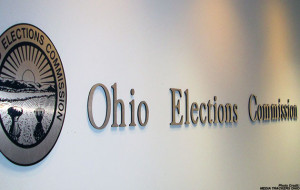SCOTUS rules against Ohio’s ‘Ministry of Truth’

By Maggie Thurber | for Ohio Watchdog
TRUTH AGENCY: The U.S. Supreme Court ruled in favor of two groups who challenged Ohio’s ‘false statement’ law, saying a probable cause finding, combined with threat of prosecution, constitutes “harm.”
The U.S. Supreme Court ruled unanimously Monday that two groups have standing to challenge Ohio’s ‘false statement’ law.
The case, filed by the Susan B. Anthony List, contested an Ohio law that prohibits certain ‘false statements’ during a political campaign. In arguments before the court, Ohio’s Election Commission, the agency charged with enforcement of the law, was likened to the Ministry of Truth in George Orwell’s “1984.”
It started in 2010 when the pro-life group tried to publish a billboard stating that then-U.S. Rep. Steven Driehaus, a Democrat, voted in favor of taxpayer-funded abortion when he voted for the Affordable Care Act.
Driehaus filed a complaint with the Ohio Elections Commission. He cited Ohio Revised Code 3517.21, which makes it a crime to make a “false statement concerning the voting record of a candidate or public official.”
The commission, tasked with being the arbiter of truth when it comes to campaign speech, found “probable cause” to believe the statement was false. SBA sued, claiming the law was a violation of the First Amendment.
After such a finding, the case would normally be referred to a prosecutor to begin criminal proceedings, but the election happened. Driehaus lost and withdrew the complaint.
Because the case was not prosecuted, lower courts said SBA didn’t have standing because it suffered no actual harm.
The Coalition Opposed to Additional Taxes and Spending, a Cincinnati group, joined the lawsuit saying it, too, intended to make the same statement that a vote for the ACA was a vote for taxpayer-funded abortions.
Both groups claimed their current and future speech was “chilled” by the probable cause ruling and the threat of criminal prosecution.
The Supreme Court agreed.
Justice Clarence Thomas referenced several prior cases in which the court held that an individual does not need to “first expose himself to actual arrest or prosecution to be entitled to challenge a statute that he claims deters the exercise of his constitutional rights.”
He also wrote that since both groups plan to engage in “comparable electoral speech regarding support for the ACA, that speech will remain arguably proscribed by Ohio’s false statement statute.”
Thomas’ opinion says the 6th Circuit Court missed the point when it ruled SBA could not be liable under Ohio’s law for “knowingly” making a false statement because it contended the campaign statement was true.
“SBA’s insistence that the allegations in its press release were true did not prevent the Commission panel from finding probable cause to believe that SBA had violated the law the first time around,” Thomas wrote. “And, there is every reason to think that similar speech in the future will result in similar proceedings, notwithstanding SBA’s belief in the truth of its allegations.”
The opinion says the threat of future enforcement “is substantial.”
“Here, the threat is even more substantial given that the Commission panel actually found probable cause to believe that SBA’s speech violated the false statement statute. Indeed, future complainants may well ‘invoke the prior probable-cause finding to prove that SBA knowingly lied.’”
Thomas notes that it isn’t just the Commission proceedings but the “additional threat of criminal prosecution” that, combined, creates an injury. He said it applies to SBA and COAST, as both face a “credible threat of enforcement.”
“And denying prompt judicial review would impose a substantial hardship on petitioners, forcing them to choose between refraining from core political speech on the one hand, or engaging in that speech and risking costly Commission proceedings and criminal prosecution on the other.”
The case was remanded back to the 6th Circuit Court of Appeals for further proceedings.







